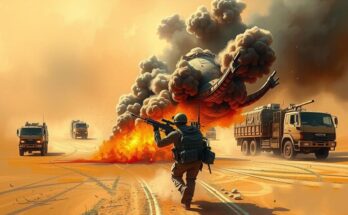M23 rebels claimed to have captured Goma, sparking gunfire and panic among residents. The DRC government described the attack as a “declaration of war” by Rwanda. The advance of rebels has raised fears of renewed regional conflict, leading to international calls for peace and the withdrawal of foreign forces. The situation remains dire for civilians facing escalating violence in this historically troubled region.
Gunfire erupted in Goma, the largest city in eastern Democratic Republic of the Congo (DRC), following the M23 rebels’ announcement of capturing the city. This declaration occurred just as the United Nations Security Council emphasized the need to halt such offensives. Witnesses reported heavily armed rebels moving into the city center while the DRC government labeled the attack as a “declaration of war” against Rwanda, amidst growing panic among the local population of two million.
The M23’s seizure of Goma coincided with a deadline they imposed on Congolese troops to surrender. Witnesses provided video evidence of the rebel entrance, depicting armed fighters within the streets. The advance of the M23 has displaced thousands of residents from the mineral-rich region, igniting fears of a broader conflict in a complex environment plagued by decades of ethnic strife and militia violence.
This recent conflict reflects ongoing tensions in eastern DRC, which has battled regional rivalries for over thirty years, resulting in one of the most severe humanitarian crises worldwide. DRC government spokesperson Patrick Muyaya declared the situation a war, calling for civilian protection. In response to the M23’s aggression, the DRC severed ties with Rwanda and sought UN sanctions against its neighbor.
International appeals for a resolution intensified as Kenya facilitated discussions between DRC President Felix Tshisekedi and Rwandan President Paul Kagame. Kenyan President William Ruto stressed the necessity for both leaders to heed peace calls. During an emergency UN Security Council meeting, DRC’s top diplomat accused Rwanda of troop incursions, asserting that this constituted a direct “declaration of war.”
In light of these developments, Rwanda’s Ministry of Foreign Affairs dismissed the accusations, attributing the escalation to the DRC’s actions. The United Nations has announced a withdrawal of foreign forces in the area but refrained from naming Rwanda explicitly. UN Secretary-General Antonio Guterres had previously urged Rwanda to withdraw its troops from the DRC, a plea firmly rejected by Kigali. Notably, several UN peacekeepers have succumbed to violence amid the growing clashes.
The eastern Democratic Republic of the Congo has long experienced conflict fostered by regional rivalries, ethnic discord, and armed militia activities. The M23 rebel group, reportedly backed by Rwanda, has been significantly involved in fighting against the Congolese armed forces and United Nations peacekeepers in the region. The situation escalated recently with the capture of Goma, which stresses regional stability and humanitarian concerns. Historical grievances and competition for resources continue to invoke intense violence and international scrutiny in this volatile region.
The M23 rebels’ claim of capturing Goma underscores a critical juncture in the ongoing conflict in eastern DRC. As political tensions escalate, the international community urges both Rwanda and the DRC to seek peaceful resolutions to avoid further humanitarian disasters. Accountability and dialogue are essential in addressing the underlying causes of the violence and restoring stability for the affected populations.
Original Source: www.aljazeera.com




